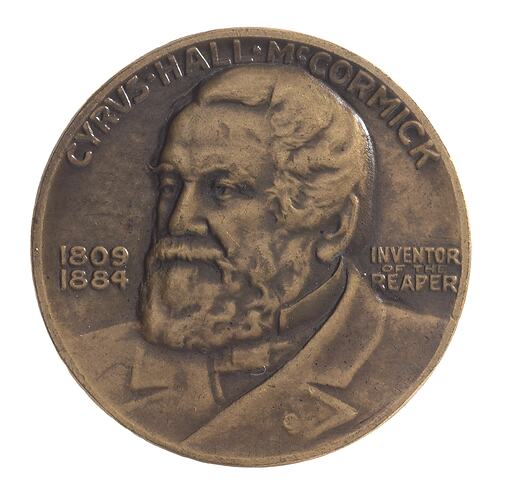Cyrus Hall McCormick was born in Virginia in 1809. He began to experiment with devices to crop wheat in his youth and and invented the reaper in 1831. His first reaper was a crude machine made out of cast iron, with iron wheels to cut the stalks of harvested crops. A flat plate six feet long - the cutting bar - prevented the stalks from sliding. The reaper used triangle-shaped knives attached to a bar that slid back and forth in a groove in the guards. The knives moved in the guards. The reaper harvested up to fifteen acres of wheat and other grains each day. Without it, only three acres could be cut. The harvester became popular immediately. It was well-received by farmers since it lowered labor costs and reduced the danger of the weather damaging crops. The reaper cut the stalks, which fell on a platform, and a worker pushed them on the ground with a rake. This still required eight to ten workers. McCormick patented the reaper in 1834.
The reaper was improved over time. In the 1850s self-rake reapers came out. Workers were no longer needed to rake the platform where the stalks fell. In the 1870s a binder was added to bind sheaves and drop them on the ground. From the the 1920s tractors were used to pull reapers and binders.
In 1847 McCormick built a reaper factory in Chicago on Water Street next to the Chicago River, and by the following year the business that was to become known as the McCormick Harvesting Machine Company factory had made seven hundred machines. By 1850 the number made had more than doubled, and by 1868 ten thousand reapers were made annually. Many of these machines were sent to other countries. In 1857 the reaper won a grand prize at the London Exposition. In 1858 the Chicago factory was said to be one of the greatest industrial establishments in the United States, with assets totaling over one million dollars.
McCormick developed innovative marketing and distribution techniques that helped make his company a success. He also benefited from the growth of Chicago as an industrial center and rail hub.
In January 1858 McCormick married Nettie Fowler, and began to spend more time away from Chicago. He also became more active in Presbyterian causes and Democratic politics. In 1859 he formed a partnership with his brothers William and Leander to form C.H. McCormick & Bros. William handled the company's finances and Leander oversaw manufacturing. In 1871, the company's factory was completely destroyed in the Chicago fire. McCormick quickly seized the opportunity to build a new factory with increased capacity and began to pursue overseas markets in earnest. By the early 1880s, the company had expanded into markets as far away as Russia and New Zealand.
McCormick's factory fell on hard times when the workers went on strike due to low wages and hard work. McCormick raised the wages and reopened the factory.
McCormick's reaper had competitors, including John Manny. McCormick sued Manny, since his reaper was very similar, but Abraham Lincoln represented John Manny in court, and McCormick lost the case.
Cyrus Hall McCormick died on May 13 1884. His son, Cyrus Jr., became president of the McCormick Harvesting Machine Company. In 1902, the company merged with major rival Deering Harvester Company to form the International Harvester Company. Three other rivals joined the merger: the Plano Manufacturing Company, the Milwaukee Harvester Company, and Warder, Bushnell and Glessner. Cyrus McCormick's sons, Cyrus, Jr. and Harold Fowler McCormick, presided over the new company during its first 40 years.
In 1931 the International Harvester Co. issued a medal commemorating the centennial of Reaper (NU 20209).
References:
Katie G. Brenner, 'Cyrus Hall McCormick: Inventor and Industrialist'. http://www.lib.niu.edu/ipo/ihy000446.html
Wisconsin Historical Society McCormick-IHC Collection http://www.wisconsinhistory.org/libraryarchives/ihc/cyrus.asp
More Information
-
Keywords
-
Localities
-
Authors
-
Article types

